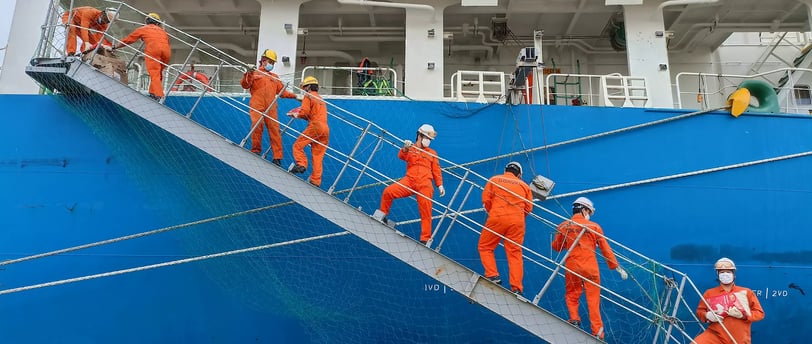2022 Amendments to the Maritime Labour Convention, 2006 Will Enter into Force on 23 December 2024!
The amendments to the Maritime Labour Convention Code enhance protections for seafarers by requiring recruitment and placement services to establish systems, such as insurance, to compensate seafarers for monetary losses if obligations are not met, and to inform them of their rights under this system. They mandate member states to facilitate the prompt repatriation of abandoned seafarers, with Port States, flag States, and labour-supplying States cooperating to ensure replacement seafarers receive all rights under the Convention. Additionally, shipowners are now obliged to provide appropriate recreational facilities on board, including internet access with reasonable charges, and member states are encouraged to provide internet access to seafarers in ports and anchorages, enhancing their well-being through improved communication and recreational amenities.
MARITIME LAWMARITIME NEWS
11/17/20243 min read


Amendment to the Code relating to Regulation 1.4 – Recruitment and Placement
Standard A1.4 – Recruitment and Placement
Revised Paragraph 5(c)(vi):
Establishment of Protection System: Recruitment and placement services are now required to establish a system of protection for seafarers, such as insurance or an equivalent appropriate measure.
Purpose: This system is designed to compensate seafarers for monetary losses they may incur if:
The recruitment and placement service fails to meet its obligations.
The relevant shipowner fails to meet obligations under the seafarers’ employment agreement.
Information to Seafarers: Seafarers must be informed of their rights under this protection system prior to or during the engagement process.
Explanation:
This amendment aims to enhance the financial protection of seafarers by ensuring they are compensated if they suffer monetary losses due to the failure of recruitment agencies or shipowners to fulfill their contractual obligations. It also emphasizes transparency by requiring that seafarers are informed about their rights under this protection system.
Amendment to the Code relating to Regulation 2.5 – Repatriation
Standard A2.5.1 – Repatriation
Insert New Paragraph 9:
Facilitation of Prompt Repatriation: Member States are required to facilitate the prompt repatriation of seafarers, including those deemed abandoned as defined in Standard A2.5.2, paragraph 2.
Cooperation Among States:
Port States, Flag States, and Labour-Supplying States must cooperate to ensure that:
Seafarers replacing those who have been abandoned are accorded their rights and entitlements under the Convention.
This applies to seafarers in their territory or on ships flying their flag.
Explanation:
This amendment strengthens provisions for the repatriation of seafarers, particularly in situations where they have been abandoned. It mandates cooperation among different states involved in maritime operations to ensure that all seafarers receive their entitled rights, thus enhancing their welfare and protection.
Amendments to the Code relating to Regulations 3.1 and 4.4 – Accommodation and Recreational Facilities / Access to Shore-based Welfare Facilities
Standard A3.1 – Accommodation and Recreational Facilities
Revised Paragraph 17:
Provision of Recreational Facilities and Services:
Shipowners must provide appropriate recreational facilities, amenities, and services, including means for social connectivity (e.g., internet access).
These facilities should be adapted to meet the special needs of seafarers living and working on ships.
Consideration of Health and Safety: The provision of these facilities should take into account Regulation 4.3 and related Code provisions on health and safety protection and accident prevention.
Explanation:
This amendment acknowledges the importance of recreational facilities and social connectivity for seafarers' well-being. By requiring shipowners to provide these amenities, it aims to improve the living conditions on board ships, which can positively impact mental health and overall job satisfaction.
Guideline B3.1.11 – Recreational Facilities, Mail, and Ship Visit Arrangements
Replaced Paragraph 4(j):
Access to Communications:
Seafarers should have reasonable access to ship-to-shore telephone communications, where available.
Any charges for using these services should be reasonable in amount.
Inserted New Paragraph 8:
Internet Access on Board:
Shipowners should, as far as reasonably practicable, provide seafarers with internet access on board their ships.
Any charges for this service should be reasonable.
Explanation:
These changes emphasize the importance of communication facilities for seafarers. By encouraging shipowners to provide internet access and ensuring charges are fair, the amendments aim to facilitate better contact with family and friends, reducing feelings of isolation during long voyages.
Guideline B4.4.2 – Welfare Facilities and Services in Ports
Inserted New Paragraph 5:
Internet Access in Ports and Anchorages:
Member States should, as far as reasonably practicable, provide seafarers on ships in their ports and associated anchorages with internet access.
Any charges for this service should be reasonable.
Explanation:
This addition extends the emphasis on providing internet access to when ships are in port or at anchorages. It reflects a commitment by member states to support the welfare of seafarers by facilitating communication, not just aboard ships but also when docked, enhancing their access to the outside world.
Note: These amendments reflect a growing recognition of the challenges faced by seafarers and represent steps taken by the international community to address their needs and rights under the Maritime Labour Convention.
